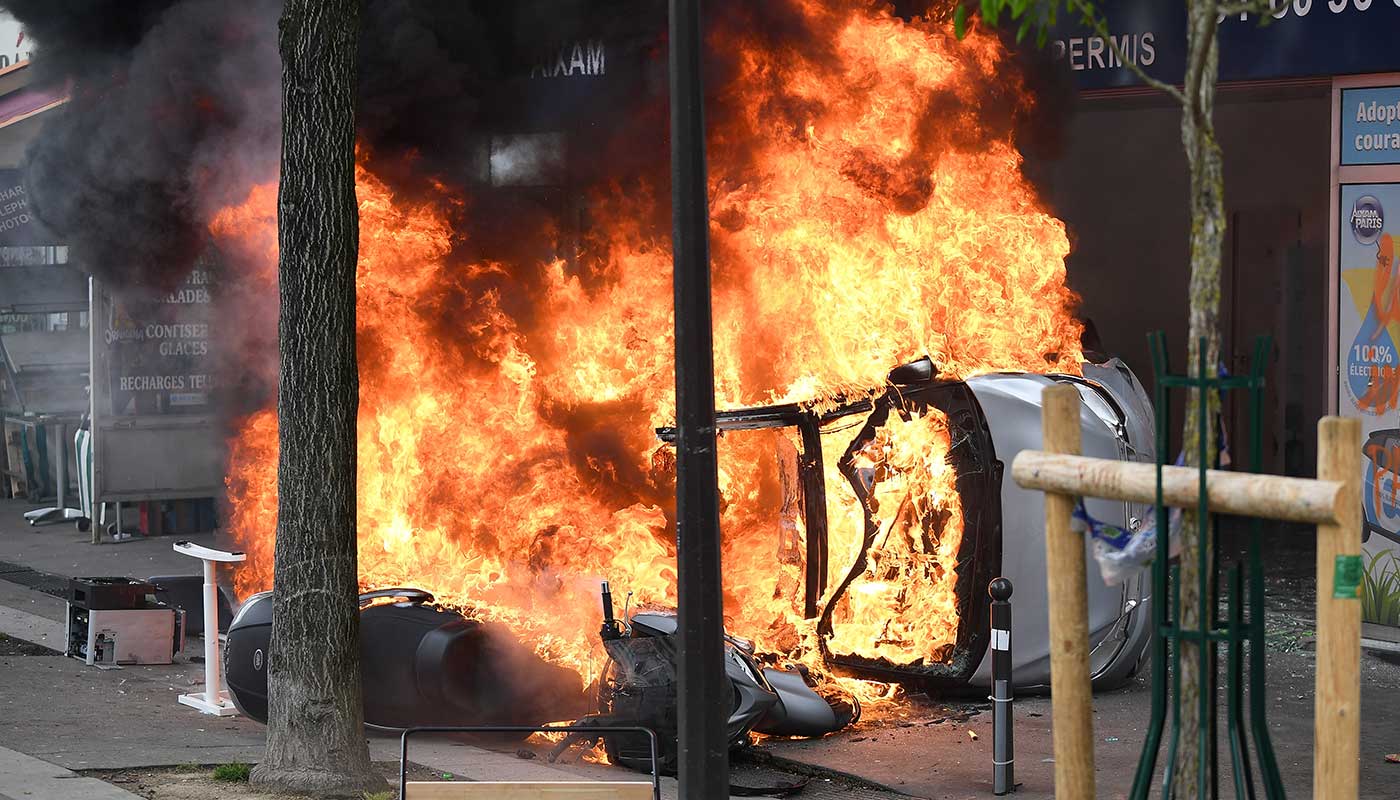Hundreds arrested in Paris May Day riots
More than 1,000 ‘Black Bloc’ protesters have clashed with police in the French capital

A free daily email with the biggest news stories of the day – and the best features from TheWeek.com
You are now subscribed
Your newsletter sign-up was successful
French riot police have used water cannons and tear gas on violent protesters during a May Day riot in Paris that has been described as the “worst violence since 1968”.
Hooded and masked protesters smashed shop windows and threw petrol bombs following a planned peaceful May Day march organised by labour unions.
More than 200 people were arrested and four people, including one police officer, were injured during the violence. Three people were found in possession of illegal weapons.
The Week
Escape your echo chamber. Get the facts behind the news, plus analysis from multiple perspectives.

Sign up for The Week's Free Newsletters
From our morning news briefing to a weekly Good News Newsletter, get the best of The Week delivered directly to your inbox.
From our morning news briefing to a weekly Good News Newsletter, get the best of The Week delivered directly to your inbox.
Paris police had earlier warned of possible clashes with “far-left anarchist groups, known as Black Blocs”, The Guardian says, following a call on social media to make Tuesday a “Revolutionary Day”.
Protesters reportedly smashed the windows of a McDonald’s restaurant before setting it on fire, and sprayed anti-fascist graffiti on a number of walls throughout the area.
The Times says that on one street, “anti-capitalists vandalised a Mercedes dealership and destroyed three of its cars while other makes of vehicle were left alone”.
French President Emmanuel Macron, who is currently visiting Australia, condemned the protesters on Twitter.
A free daily email with the biggest news stories of the day – and the best features from TheWeek.com
“Everything will be done so that the perpetrators are identified and held responsible for their actions,” he said.
Government spokesman Benjamin Griveaux criticised the protesters for covering their faces, saying: “When you have sincere convictions, you demonstrate with your face unmasked.”
Macron is currently “locked in a battle with the trade unions over his plans to liberalise labour regulations”, the ABC says.
French railway staff have begun three months of rolling strikes over the government’s plans to overhaul the state-run SNCF railway.
The violence came on the 50th anniversary of the beginning of the 1968 Paris protests and general strikes that paralysed France for more than a month.
-
 The ‘ravenous’ demand for Cornish minerals
The ‘ravenous’ demand for Cornish mineralsUnder the Radar Growing need for critical minerals to power tech has intensified ‘appetite’ for lithium, which could be a ‘huge boon’ for local economy
-
 Why are election experts taking Trump’s midterm threats seriously?
Why are election experts taking Trump’s midterm threats seriously?IN THE SPOTLIGHT As the president muses about polling place deployments and a centralized electoral system aimed at one-party control, lawmakers are taking this administration at its word
-
 ‘Restaurateurs have become millionaires’
‘Restaurateurs have become millionaires’Instant Opinion Opinion, comment and editorials of the day
-
 Greenland’s capital becomes ground zero for the country’s diplomatic straits
Greenland’s capital becomes ground zero for the country’s diplomatic straitsIN THE SPOTLIGHT A flurry of new consular activity in Nuuk shows how important Greenland has become to Europeans’ anxiety about American imperialism
-
 Epstein files topple law CEO, roil UK government
Epstein files topple law CEO, roil UK governmentSpeed Read Peter Mandelson, Britain’s former ambassador to the US, is caught up in the scandal
-
 Iran and US prepare to meet after skirmishes
Iran and US prepare to meet after skirmishesSpeed Read The incident comes amid heightened tensions in the Middle East
-
 Israel retrieves final hostage’s body from Gaza
Israel retrieves final hostage’s body from GazaSpeed Read The 24-year-old police officer was killed during the initial Hamas attack
-
 China’s Xi targets top general in growing purge
China’s Xi targets top general in growing purgeSpeed Read Zhang Youxia is being investigated over ‘grave violations’ of the law
-
 Panama and Canada are negotiating over a crucial copper mine
Panama and Canada are negotiating over a crucial copper mineIn the Spotlight Panama is set to make a final decision on the mine this summer
-
 Why Greenland’s natural resources are nearly impossible to mine
Why Greenland’s natural resources are nearly impossible to mineThe Explainer The country’s natural landscape makes the task extremely difficult
-
 Iran cuts internet as protests escalate
Iran cuts internet as protests escalateSpeed Reada Government buildings across the country have been set on fire